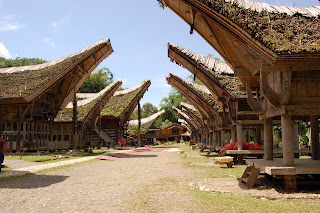You'd probably like Tana Toraja if you like some quiet and greenery. At one point, when I was taking a stroll near the Prince Hotel, I saw lush crops growing along the roadside that I started to think that anything could grow here. It thus struck me as queer that the Dutch who had in the 17th century, established trade and political control on Sulawesi through the Dutch East Indies Company, ignored this mountainous area not just because acess was difficult but the land here is said to have little productive agricultural value. It was only in the late 19th century that the Dutch, being concerned about the spread of Islam, stood up and became interested in the people here. Before the 20th century therefore, the Torajans, being untouched by the outside world, live and practised animism in autonomous villages. The early Dutch missionaries did face strong opposition among Torajans. Afterall, they were running from the Muslims in the first place. Enroute to Tana Toraja, we had passed a Muslim settlement whom the guide had said were probably the same stock as the Torajans. In ancient times, when Islam was spreading, the animists had the options to convert or move out and the diehard animist just moved further upland. Even when the Dutch moved some Torajans to the lowlands to control them, conversion was low initially. Only 10% of the population converted to Christianity in 1950 but in the 1930s, when the Muslim lowlanders attacked the Torajans, conversion became widespread as the people began to align themselves with the Dutch for political protection. Probably, there was not so much quiet or greenery before...27
It seems all quiet and green...

It seems all quiet and green...




Comments